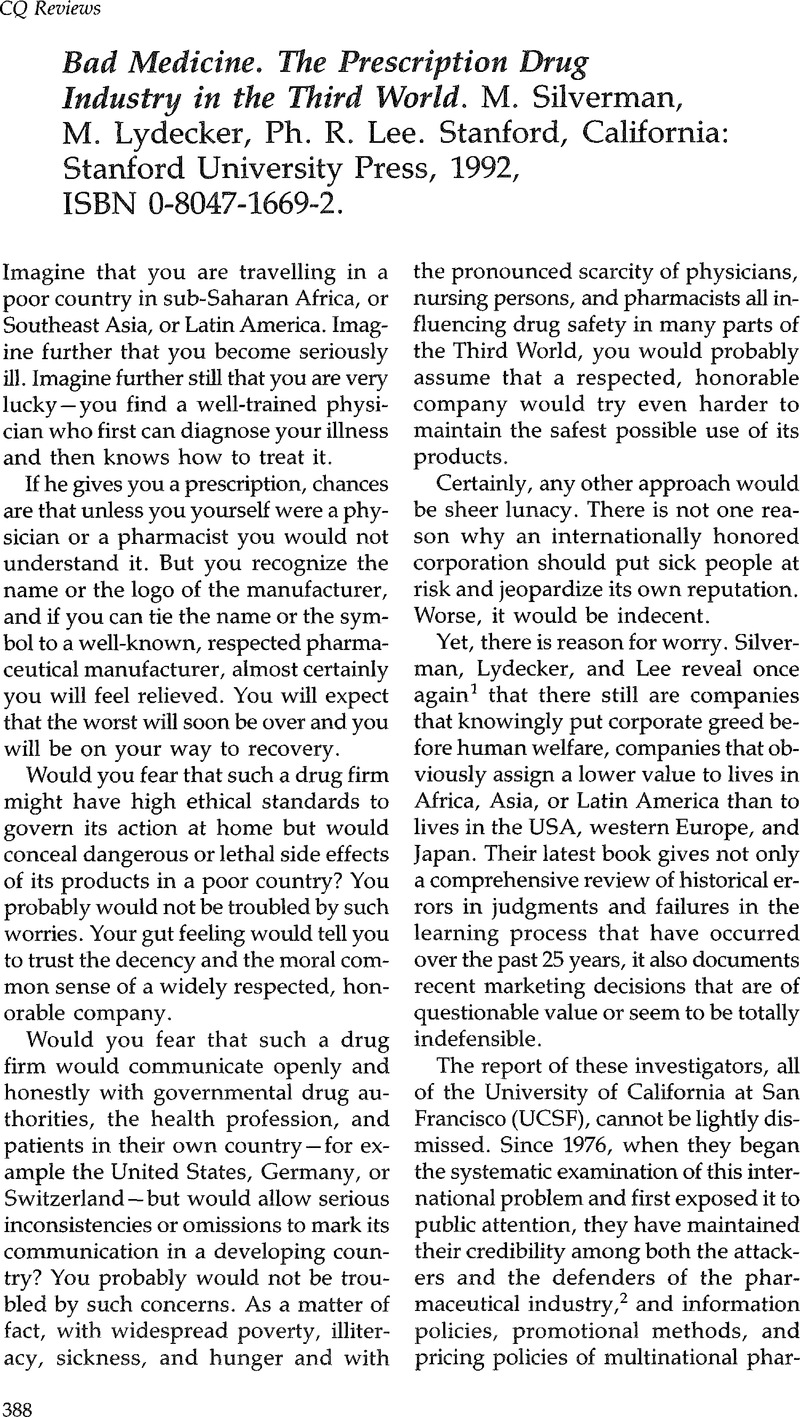No CrossRef data available.
Article contents
Bad Medicine. The Prescription Drug Industry in the Third World. M. Silverman, M. Lydecker, Ph. R. Lee. Stanford, California: Stanford University Press, 1992, ISBN 0-8047-1669-2.
Published online by Cambridge University Press: 29 July 2009
Abstract

- Type
- CQ Reviews
- Information
- Copyright
- Copyright © Cambridge University Press 1993
References
Notes
1. See Silverman, M. The Drugging of the Americas. How Multinational Corporations Say One Thing About Their Products to Physicians in the United States, and Another Thing to Physicians in Latin America. Berkeley: University of California Press, 1976Google Scholar; and Silverman, M, Lee, PR, Lydecker, M. Prescription for Death. The Drugging of the Third World. Berkeley: University of California Press, 1982.Google Scholar
2. See Lexchin, J. Pharmaceutical promotion in the Third World. In: Journal of Drug Issues 1992;22: 417–53.CrossRefGoogle Scholar
3. See, e.g., Heller, T. Poor Health, Rich Profits, Multinational Drug Companies and the Third World. Nottingham, England: Spokesman Books, 1977Google Scholar. Melrose, D. Bitter Pills. Medicine and the Third World Poor. Oxford, England: Oxfam, 1982Google Scholar. Muller, M. The Health of Nations. A North-South Investigation. London: Faber and Faber, 1982Google Scholar. Gereffi, G. The Pharmaceutical In- dustry and Dependency in the Third World. Princeton, New Jersey: Princeton University Press, 1983CrossRefGoogle Scholar. Medawar, C. Drug Disinformation. London: Social Audit, 1980Google Scholar. Medawar, C. The Wrong Kind of Medicine? London: Hodder and Stoughton, 1984Google Scholar. Chetley, A. Peddling Placebos: An Analysis of Cough and Cold Remedies. Amsterdam: HAI, 1989Google Scholar. Chetley, A. World Health and the Pharmaceutical Industry. London: Zed Books, 1990Google Scholar. Other books suggest that there is also reason to worry in countries like the USA. See Mintz, M. At Any Cost. Corporate Greed, Women, and the Dalkon Shield. New York: Pantheon Books, 1985.Google Scholar
4. See Leisinger, KM. Health Policy for Least Developed Countries. Basel: Ciba-Geigy Foundation for Cooperation with Developing Countries, 1985.Google Scholar
5. Myrdal, G. Asian Drama. An Inquiry into the Poverty of Nations. Harmondworth, England: Penguin, 1968:66 (definition), 116 (ineffectual policies), 894 (failure to enforce legislation), 950–2 (prevalence of corruption).Google Scholar
6. See Horisberger, B, Dinkel, R, eds. The Perception and Management of Drugs Safety Risks. New York: Springer (Health Systems Research), 1989CrossRefGoogle Scholar; Dinkel, R, Horisberger, B, Tolo, KW, eds. Improving Drug Safety-A Joint Responsibility. New York: Springer (Health Systems Research), 1991.CrossRefGoogle Scholar
7. Gellerman, SW. Why good managers make bad ethical choices. Harvard Business Review 1986;07./08.:85.Google Scholar


